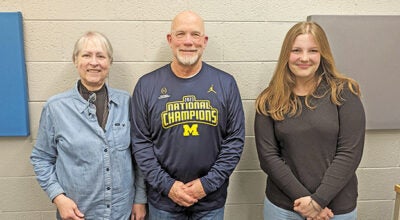Author discusses emotional abuse
Published 6:12 pm Monday, October 16, 2017

- Mishawaka psychotherapist and author Erin K. Leonard spoke about emotional abuse during her presentation at the fourth annual SMC mentoring dinner Oct. 12. (Submitted photo)
“Projective identification” permeates marriages, dating relationships, teacher-student relationships, parent-child relationships, work relationships and friendships.
“All it takes is two players,” Mishawaka psychotherapist Erin K. Leonard, Ph.D., author of “Emotional Terrorism: Breaking the Chains of a Toxic Relationship,” told Southwestern Michigan College First Lady Sarah Mathews’ fourth annual mentoring dinner Oct. 12 on the Dowagiac campus.
Recipients, “contrary to popular opinion,” are sound, usually open-hearted deep thinkers and feelers.
“Recipients have consciences and are usually accountable, introspective, open-minded and insightful,” Leonard said. “They deeply understand someone else’s perspective, even if it differs from their own.”
Projectors are the opposite.
“Projectors are profoundly, pathologically impaired,” Leonard said. “They compensate with narcissism, vanity and arrogance. Though they seem larger than life, like they know everything, and seem very important, they are actually fragile. A projector’s identity or self-esteem inside their chest would look like a glass box that shatters if the smallest pebble is thrown. Projectors spend every waking breath deflecting anything coming in — insight, accountability, ownership.”
“They deflect and project out,” Leonard said. “Recipients, on the other hand, identity structures in their chests would be wood boxes. It might nick, but the structure withstands heavier stones. They can tolerate painful assaults to their ego.”
“Emotional abuse, like a noxious gas, poisons insidiously, leaving victims unaware why they feel sick,” Leonard said. “All human beings have strengths and weaknesses. When someone in a relationship exploits their partner’s insecurities, aiming to humiliate them and fill them with shame, that is emotional abuse.”
“It starts with judgment and criticism,” she said. “Next, name-calling, putdowns, derogatory statements. After that, verbal attacks and assaults. Sometimes physical intimidation. This describes the domestic violence cycle.
“It’s imperative we understand this cycle. It’s also critical we understand the psychological dynamic this cycle originates from and the psychological dynamic that perpetuates domestic violence called projective identification.”
Projectors “have to get rid of painful insecurities they have inside,” Leonard said. “Projection is their defense mechanism. They relieve themselves of shameful qualities by seeing them in their partner. When they see them in someone else, they feel entitled to bully, harass, punish, control and dominate that person. For example, a wife calling her husband a loser because he doesn’t bring home enough money when she doesn’t hold a job or a boss calling an employee incompetent while taking credit for her work.”
“Recipients walk the earth with open hearts, unknowingly absorbing a projector’s insecurities and self-doubt,” Leonard said. They look to the projector for support and guidance. The projector exploits those insecurities, stripping them of the essence of who they are and eroding their dignity. Quiet heroes must stand up and tell noisy haters to sit down.”
“When I started, I got less support from women than from men. Stick up for each other,” said Michigan State Police Niles Post Lt. Melinda Logan, a 23-year police officer.”
She and her husband, also with MSP, have three children and two grandchildren.
“Men were uncomfortable dealing with domestic violence, child abuse and sexual assaults,” Logan said. “We’re taught to be professional in our demeanor. Men are taught to protect women. It hurts them when a woman or child is abused, whether they show that or not.”
“U.S. Justice Department statistics indicate 20 percent of homicides are committed within families or intimate relationships. One in three female homicide victims is killed by an intimate partner. Women can be arrested, too,” Logan said.
Domestic and Sexual Abuse Services’ Deborah Hackworth noted her agency serves Cass, St. Joseph and part of Van Buren County.
Campus callers can dial (269) 783-8880 for crisis counseling.
“We set that up so you have direct access if you need help,” Hackworth said. “I was touched Dr. Leonard said recipient boxes are wood. Wood is strong. Victims get labeled as weak. DASAS helps you realize strengths to empower you. We’re more than a shelter. We provide food, clothing and transportation. We have support groups in Dowagiac, Three Rivers and Sturgis. Children who witness domestic violence suffer the same trauma as their parents.”
Mathews, a Cass County assistant prosecutor, said, “The first year we talked about climbing in high heels to reach goals and break the glass ceiling. It takes a team to propel you to the top. The second year we talked about what it means to be Lady Roadrunners, who are always kind. Last year, Kim Gravel talked about believing in your own beauty and finding your purpose.
“Mentors have power. Mentees have potential. Knowledge takes you from one to another. Mentoring is not a formal contract. It can be an hour conversation giving advice. October is Domestic Violence Awareness Month, which we should all be knowledgeable about preventing,” Mathews said.
Each attendee received two copies of Leonard’s book — one to keep and one to share.
Southwestern Michigan College is a public, residential and commuter, community college, founded in 1964. The college averages in the top 10 percent nationally for student academic success based upon the National Community College Benchmark Project. Southwestern Michigan College strives to be the college of first choice, to provide the programs and services to meet the needs of students, and to serve our community. The college is accredited by The Higher Learning Commission of the North Central Association of Colleges and Schools and is a member of the American Association of Community Colleges.






